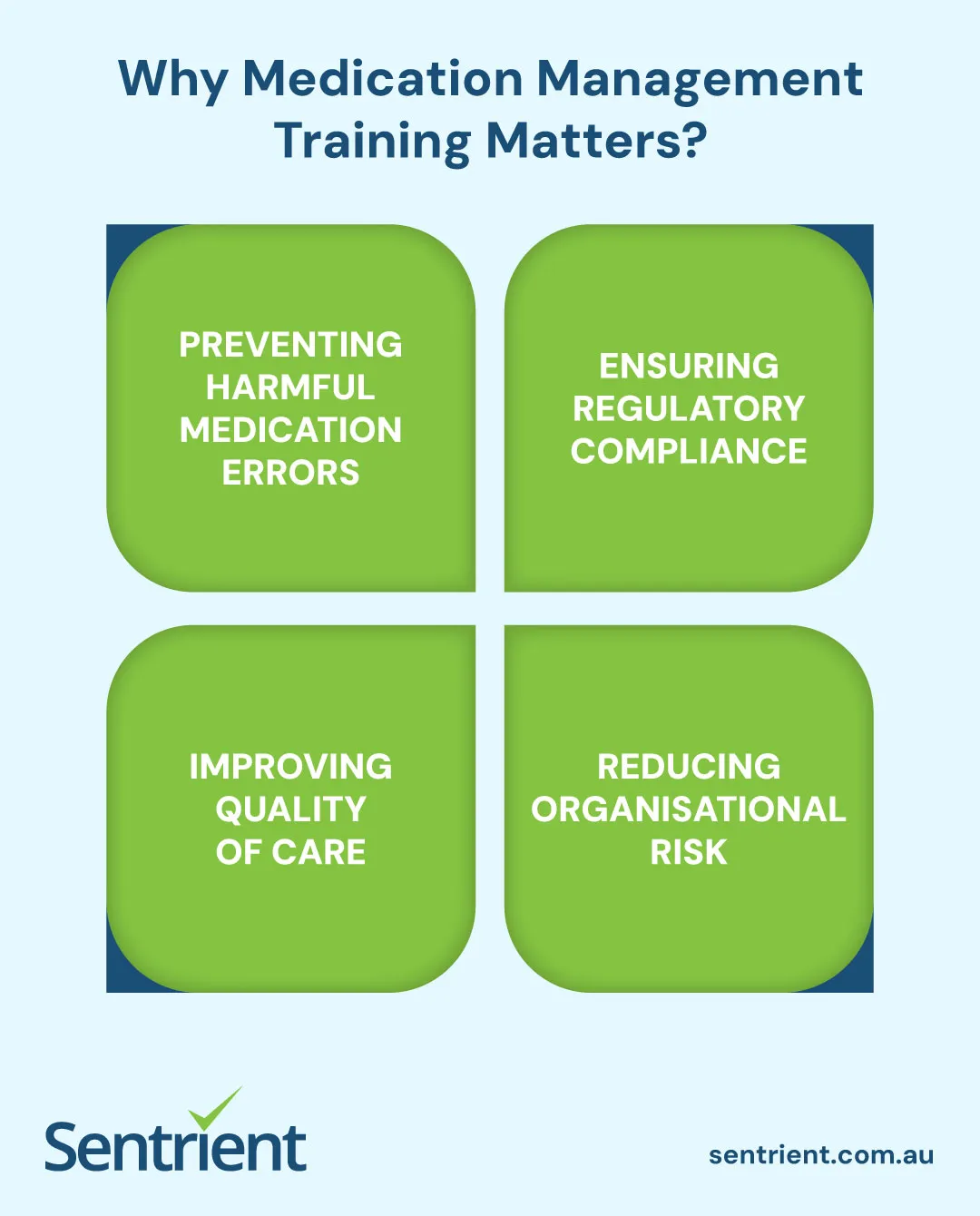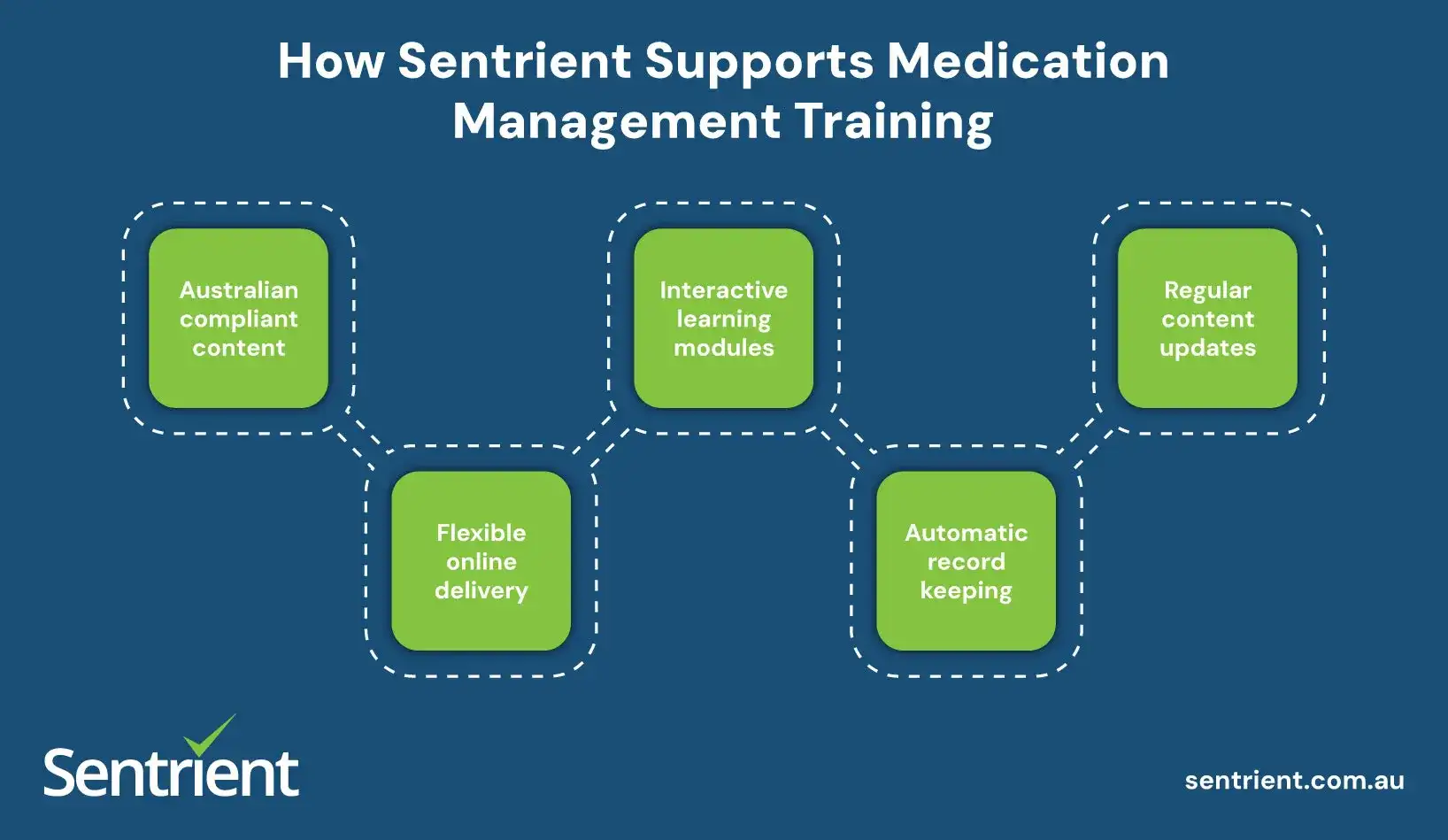In healthcare and care settings across Australia, the proper handling of medications can literally be a matter of life and death. Medication management training equips staff with essential skills to safely handle, administer, and monitor medications, importantly reducing the risk of potentially harmful errors.
For organisations in aged care, disability support, and community health services, this training isn’t just beneficial – it’s a primary compliance requirement that protects both clients and staff.
With medication errors contributing to thousands of hospitalisations annually in Australia, understanding proper medication management has never been more important. Let’s explore what medication management training involves and why it’s crucial for your organisation.
What Is Medication Management Training?
Medication management training is a structured educational program designed to teach healthcare workers and carers how to safely handle medications throughout their entire lifecycle.
This specialised training covers everything from understanding medication properties and ethical considerations to practical administration techniques and documentation protocols. It prepares staff to confidently support clients with their medication needs while maintaining compliance with Australian healthcare regulations and organisational policies.
The training is particularly essential for support workers, nurses, and care staff who regularly assist vulnerable individuals with their medication routines.
Key Components of Medication Management Training
A comprehensive medication management course includes several key components:
| Component | Description |
|---|---|
| Medication Knowledge | Understanding different medication types, forms, and how they work |
| Safety Protocols | Procedures to minimise risk and ensure client safety |
| Administration Techniques | Correct methods for giving different types of medications |
| Storage and Handling | Proper medication storage and handling to ensure the safety, effectiveness, and integrity of medications |
| Documentation | Proper record-keeping and reporting requirements |
| Emergency Procedures | Responding to medication errors and adverse reactions |
These components work together to create a multifaceted approach to medication safety that protects both clients and care organisations.
Why Is Medication Management Training Important?

1. Prevents Harmful Medication Errors
Did you know that medication errors contribute to approximately 250,000 hospital admissions in Australia each year and around 50% of these are potentially preventable? Proper training dramatically reduces the risk of errors such as incorrect dosages, missed medications, or administration of the wrong medicine – mistakes that can have serious or even tragic consequences.
With structured training, staff learn to implement multiple safety checks and follow established protocols that serve as protective barriers against potentially harmful mistakes.
2. Ensures Regulatory Compliance
Australian healthcare and aged care services operate under strict regulatory frameworks that mandate proper medication handling. Organisations must demonstrate that their staff are adequately trained and competent in medication management to meet their compliance obligations.
Non-compliance can result in serious consequences, including regulatory penalties, loss of accreditation, and increased liability risk, making training not just good practice but a business necessity.
3. Improves Quality of Care
When staff are confident in their medication management skills, they can focus more on delivering person-centred care rather than worrying about making mistakes. Clients receive their medications correctly and on time, which helps maintain their health and wellbeing while building trust in the care they’re receiving.
This enhanced standard of care contributes to better health outcomes and higher satisfaction among clients and their families.
4. Reduces Organisational Risk
For care providers, medication errors can lead to significant legal and financial repercussions, including potential litigation and increased insurance premiums. Investing in proper medication management training helps mitigate these risks by creating a culture of safety and compliance throughout the organisation.
The cost of comprehensive training is minimal compared to the potential consequences of medication related incidents, making it a sound risk management strategy.
Who Needs Medication Management Training?
Medication management training is beneficial for a wide range of professionals:
- Aged Care Workers who assist elderly clients with daily medication regimes
- Disability Support Workers providing medication assistance in various settings
- Community Care Staff supporting clients living independently
- Nurses working in residential or community settings
- Healthcare Assistants and other support staff
- Supervisors and Managers overseeing medication processes
- Home Care Workers helping clients in their own residences
Anyone who handles, administers, or oversees medications in a care context should receive appropriate training tailored to their specific role and responsibilities.
What Does a Quality Medication Management Course Cover?
Understanding Medication Basics
What are the different types of medications and how do they work? A quality course explains medication classes, forms, and routes of administration in clear, accessible language. Participants learn to identify common medications, understand their purposes and potential side effects, and recognise when intervention might be necessary.
This foundational knowledge helps staff make informed decisions and recognise potential issues before they become serious problems.
Safe Handling and Storage Protocols
How should medications be stored to maintain their effectiveness and prevent unauthorised access? Training covers temperature requirements, security measures, and segregation practices for different types of medications, including special protocols for controlled substances.
Proper handling techniques to prevent contamination and maintain medication integrity are also essential components of comprehensive training.
Administration Procedures
When it comes to giving medications to clients, precision and consistency are crucial. Quality training provides step-by-step guidance on the Five Rights of medication administration:
- Right patient
- Right medication
- Right dose
- Right time
- Right route
These principles form the backbone of safe medication administration practices across all care settings.
Documentation and Reporting
Accurate record keeping is a critical aspect of medication management that protects both clients and staff.
Training teaches participants how to properly document medication administration, record observations, and report any issues or incidents according to organisational policies and regulatory requirements.
Clear documentation creates an accountability trail and enables continuity of care across different staff and shifts.
How Long Does Medication Management Training Take?
The duration of medication management training varies depending on its scope and depth:
- Basic awareness courses: Typically 15 – 30 minutes
- Comprehensive administration training: 4 – 8 hours
- Advanced specialized training: 1 – 2 days
- Refresher courses: 1 – 2 hours
Most organisations require annual refresher training to ensure staff knowledge remains current with best practices and regulatory requirements. With Sentrient’s flexible online learning platform, staff can complete their training at their own pace while managers track progress and compliance in real-time.
How Sentrient Supports Medication Management Training

- Australian-compliant content specifically designed for the local regulatory environment
- Flexible online delivery allowing staff to complete training at their convenience
- Interactive learning modules that enhance engagement and knowledge retention
- Automatic record-keeping that simplifies compliance reporting
- Regular content updates reflecting changes in best practice and regulations
Our platform makes it easy to assign, track, and report on training completion, ensuring your organisation maintains continuous compliance.
Best Practices for Implementing Medication Management Training
Regular Refresher Training
Knowledge and skills can fade over time, especially for procedures that aren’t performed daily. Scheduling regular refresher training, typically annually, helps keep medication management skills sharp and updates staff on any changes to protocols or regulations.
Practical Assessment
While theoretical knowledge is important, practical skills assessment ensures staff can apply what they’ve learned in real-world situations. Combining online learning with supervised practical assessment creates a comprehensive approach to competency verification.
Continuous Improvement
The field of medication management is constantly evolving as new medications and best practices emerge. Organisations should regularly review and update their medication management policies and training to reflect current best practices and regulatory requirements.
Feedback from staff who complete the training can provide valuable insights for improving future training sessions.
Common Challenges in Medication Management
Time Constraints
In busy care environments, staff often feel pressured to complete medication rounds quickly, which can increase the risk of errors. Proper training helps staff develop efficient workflows that maintain safety standards even under time pressure.
Complex Medication Regimes
Many clients, particularly in aged care, have complex medication schedules involving multiple medications with specific administration requirements. Comprehensive training prepares staff to navigate these complexities confidently and safely. Digital tools integrated with training can provide additional support for managing complex medication regimes.
Staff Turnover
High staff turnover in care settings can create gaps in medication management knowledge and practice. A standardised, accessible training program ensures new staff quickly develop the necessary skills to safely manage medications.
Conclusion
Medication management training is a fundamental component of safe, compliant care delivery in Australian healthcare and support services. It protects clients from potentially harmful errors, ensures regulatory compliance, and reduces organisational risk.
By investing in quality medication management training, organisations demonstrate their commitment to excellence in care and their dedication to the wellbeing of both clients and staff.
With Sentrient’s comprehensive learning management system, implementing and maintaining effective medication management training has never been simpler or more efficient.
Ready to improve your organisation’s medication management training program? Sentrient offers Australian-compliant, easy-to-implement training solutions that protect your clients and your business. Request a free demo today to see how our medication management training modules can strengthen your compliance program and improve care outcomes.
FAQs
1. Is medication management training mandatory in Australia?
Yes, for organisations providing care services where staff administer or assist with medications, training is mandatory under various Australian quality and safety standards.
2. How often should staff complete medication management training?
Most regulatory frameworks and industry best practices recommend annual refresher training, though some organisations may require more frequent updates for high-risk medication procedures.
3. Can medication management training be completed online?
Yes, comprehensive online training is available and widely accepted, though many organisations combine this with practical assessments to verify hands-on skills.
4. What’s the difference between medication administration and medication management?
Medication administration refers specifically to the act of giving medications to clients, while medication management encompasses the entire process from ordering and storage through to administration, monitoring, and documentation.
5. Do volunteers need medication management training?
If volunteers assist with or administer medications in any capacity, they should receive appropriate training commensurate with their responsibilities, just as paid staff would.
6. How can we track compliance with medication management training requirements?
Sentrient’s learning management system automatically tracks completion of assigned training modules and generates compliance reports, making it easy to monitor and demonstrate regulatory compliance.
Read More About Medication Management:
- New Online Medication Management Training Course Now Available
- What Is A Learning Management System (LMS) And Why Do You Need One
- Announcing The Launch Of Our Online Human Rights Awareness Training Course
- FREE Online Infection Prevention and Control Course for Australian Businesses
- Announcing The Launch Of Our New Online Hand Hygiene Training Course For Healthcare Workers





